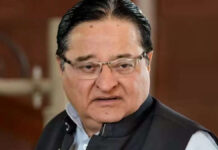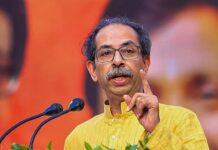BJP MP Jagdambika Pal, who heads the Joint Parliamentary Committee (JPC) on the proposed Waqf Amendment Bill, on Monday reprimanded Trinamool Congress leader Kalyan Banerjee for making public statements on the matter instead of addressing the committee. Pal’s criticism followed a viral video in which Banerjee allegedly claimed that “any location where Muslims offer namaz would automatically be considered a Waqf property,” sparking further controversy.
Speaking about the matter, Pal expressed his displeasure, stating, “Kalyan Banerjee is a member of the JPC, and he should keep his views before us and not give statements outside.” The BJP leader’s remarks were a direct response to Banerjee’s comments, which were made outside the parliamentary forum and have fueled further debate on the contentious Waqf Bill.
The controversy surrounding the Waqf Bill deepened with the West Bengal government’s decision to bring a motion in the state assembly opposing the bill. Pal condemned this move, calling it an “attack” on both parliamentary democracy and the constitutional principles of India. He emphasized that such actions undermine the democratic process and the functioning of legislative bodies.
Pal also defended the JPC’s actions, saying that the committee had made considerable efforts to engage all stakeholders. “In the last three months, we held 29 meetings and heard more than 147 delegations. We have given opportunities to all organizations as per our mandate,” he stated. The BJP leader added that he had personally listened to all opposition members, including Kalyan Banerjee, Sanjay Singh, and Asaduddin Owaisi, addressing their concerns and opinions.
The opposition members of the JPC had walked out of a meeting on November 27, demanding that several state Waqf boards still waiting to be heard should have the opportunity to voice their opinions. They also requested an extension of the committee’s tenure, which was set to expire on November 29. Pal responded to the opposition’s concerns, suggesting that boycotting meetings was not the right approach and that all voices had been considered during the ongoing deliberations.
As the debate continues, the Waqf Amendment Bill remains a focal point of tension between the government and opposition, with the issue of Waqf properties and their management taking center stage in the national discourse.







can i purchase clomid pills where buy cheap clomid no prescription where can i get clomiphene cost cheap clomid without rx can i purchase clomiphene without a prescription how to buy cheap clomiphene without dr prescription buying generic clomiphene without dr prescription
Thanks recompense sharing. It’s outstrip quality.
I’ll certainly return to read more.
buy zithromax without a prescription – azithromycin cheap order flagyl for sale
purchase semaglutide pill – order periactin 4 mg without prescription generic periactin 4mg
buy domperidone 10mg without prescription – motilium online flexeril ca
buy amoxiclav pill – https://atbioinfo.com/ order ampicillin sale
order generic esomeprazole 20mg – https://anexamate.com/ esomeprazole generic
warfarin over the counter – anticoagulant cheap losartan 25mg
mobic online order – swelling mobic 7.5mg pill
buy erectile dysfunction drugs – free samples of ed pills cheap ed drugs
amoxil drug – order generic amoxil buy amoxil generic
buy diflucan 100mg pills – https://gpdifluca.com/ order forcan pill
tadalafil 20mg canada – https://ciltadgn.com/# e20 pill cialis
sildenafil vs tadalafil vs vardenafil – https://strongtadafl.com/# cialis com free sample
buy zantac 300mg online – https://aranitidine.com/# purchase zantac pill
can you buy viagra online – can buy viagra london cheap cialis and viagra
More posts like this would force the blogosphere more useful. lasix 40 mg para que sirve
More peace pieces like this would make the интернет better. https://buyfastonl.com/furosemide.html
This is a keynote which is forthcoming to my heart… Diverse thanks! Faithfully where can I find the acquaintance details an eye to questions? https://ursxdol.com/get-metformin-pills/
This is the type of delivery I unearth helpful. https://prohnrg.com/product/cytotec-online/
This is the kind of glad I have reading. https://aranitidine.com/fr/levitra_francaise/
More posts like this would make the online elbow-room more useful. https://ondactone.com/spironolactone/
More content pieces like this would insinuate the интернет better.
buy imitrex online
More articles like this would pretence of the blogosphere richer. https://myvisualdatabase.com/forum/profile.php?id=118018
cheap dapagliflozin 10mg – buy forxiga 10 mg dapagliflozin 10 mg pills
This is the compassionate of writing I rightly appreciate. http://www.01.com.hk/member.php?Action=viewprofile&username=Ylwxrh
You can keep yourself and your ancestors close being alert when buying medicine online. Some pharmacy websites function legally and offer convenience, secretiveness, rate savings and safeguards over the extent of purchasing medicines. buy in TerbinaPharmacy https://terbinafines.com/product/allegra.html allegra
More posts like this would make the blogosphere more useful. TerbinaPharmacy
Thanks towards putting this up. It’s okay done.
kuwin sở hữu kho game đa dạng từ slot đến trò chơi bài đổi thưởng, mang đến cho bạn những giây phút giải trí tuyệt vời.
Đến với J88, bạn sẽ được trải nghiệm dịch vụ cá cược chuyên nghiệp cùng hàng ngàn sự kiện khuyến mãi độc quyền.
Đến với J88, bạn sẽ được trải nghiệm dịch vụ cá cược chuyên nghiệp cùng hàng ngàn sự kiện khuyến mãi độc quyền.
苹果签名,苹果超级签平台,ios超级签平台ios超级签苹果企业签,苹果超级签,稳定超级签名